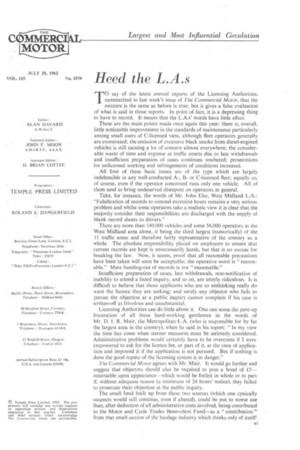Heed the L.A.s
Page 35

If you've noticed an error in this article please click here to report it so we can fix it.
T0 say of the latest annual reports of the Licensing Authorities, summarized in last week's issue of The Commercial Motor, that the mixture is the same as before is true; but it gives a false evaluation of what is said in those reports. In point of fact, it is a depressing thing to have to record. It means that the L.A.s' words have little effect.
These are the main points made once again this year: there is, overall, little noticeable improvement in the standards of maintenance particularly among small users of C-licensed vans, although fleet operators generally are exonerated; the emission of excessive black smoke from diesel-engined vehicles is still causing a lot of concern almost everywhere; the considerable waste of time and expense at traffic courts due to late withdrawals and insufficient preparation of cases continues unabated; prosecutions for unlicensed working and infringements of conditions increased.
All four of these basic issues are of the type which are largely indefensible in any well-conducted A-, Bor C-licensed fleet; equally so, of course, even if the operator concerned runs only one vehicle. All of them tend to bring undeserved disrepute on operators in general.
Take, for instance, the words of Mr. John Else, West Midland L.A.: "Falsification of records to conceal excessive hours remains a very serious problem and whilst some operators take a realistic view it is clear that the majority consider their responsibilities are discharged with the supply of blank record sheets to drivers."
There are more than 140,000 vehicles and some 56,000 operators in the West Midland area alone, it being the third largest (numerically) of the 11 traffic areas and therefore fairly representative of the country as a whole. The absolute responsibility placed on employers to ensure that current records are kept is unnecessarily harsh, but that is no excuse for breaking the law. Now, it seems, proof that all reasonable precautions have been taken will soon be acceptable; the operative word is " reasonable." Mere handing-out of records is not "reasonable."
Insufficient preparation of cases, late withdrawals, non-notification of inability to attend a listed inquiry, and so on, are utterly ridiculous. It is difficult to believe that those applicants who are so unthinking really do want the licence they are seeking; and surely any objector who fails to pursue the objection at a public inquiry cannot complain if his case is written-off as frivolous and unsubstantial.
Licensing Authorities can do little about it. One can sense the pent-up frustration of all these hard-working gentlemen in the •words of Mr. D, I. R. Muir, the Metropolitan.L.A. (who is responsible for by far the largest area in the country), when he said in his report: "In my view the time has come when sterner measures must be seriously considered. Administrative problems would certainly have to be overcome if I were empowered to ask for the licence fee, or part of it, at the time of application and impound it if the application is not pursued. But if nothing is done the good repute of the licensing system is in danger." , The Commercial Motor agrees with Mr. Muir. It would go further and suggest that objectors should also be required to post a bond of £5— returnable upon appearance--which would be forfeit in whole or in part if, without adequate reason (a minimum of 24 hours' notice), they failed to prosecute their objection at the public inquiry.
The small fund built up from these two sources (which one cynically suspects would still continue, even if abated), could be put to worse use than, after deduction of all administrative costs involved, being contributed to the Motor and Cycle Trades Benevolent Fund—as a contribution" from that small section of the haulage industry which thinks only of itself!




















































































































